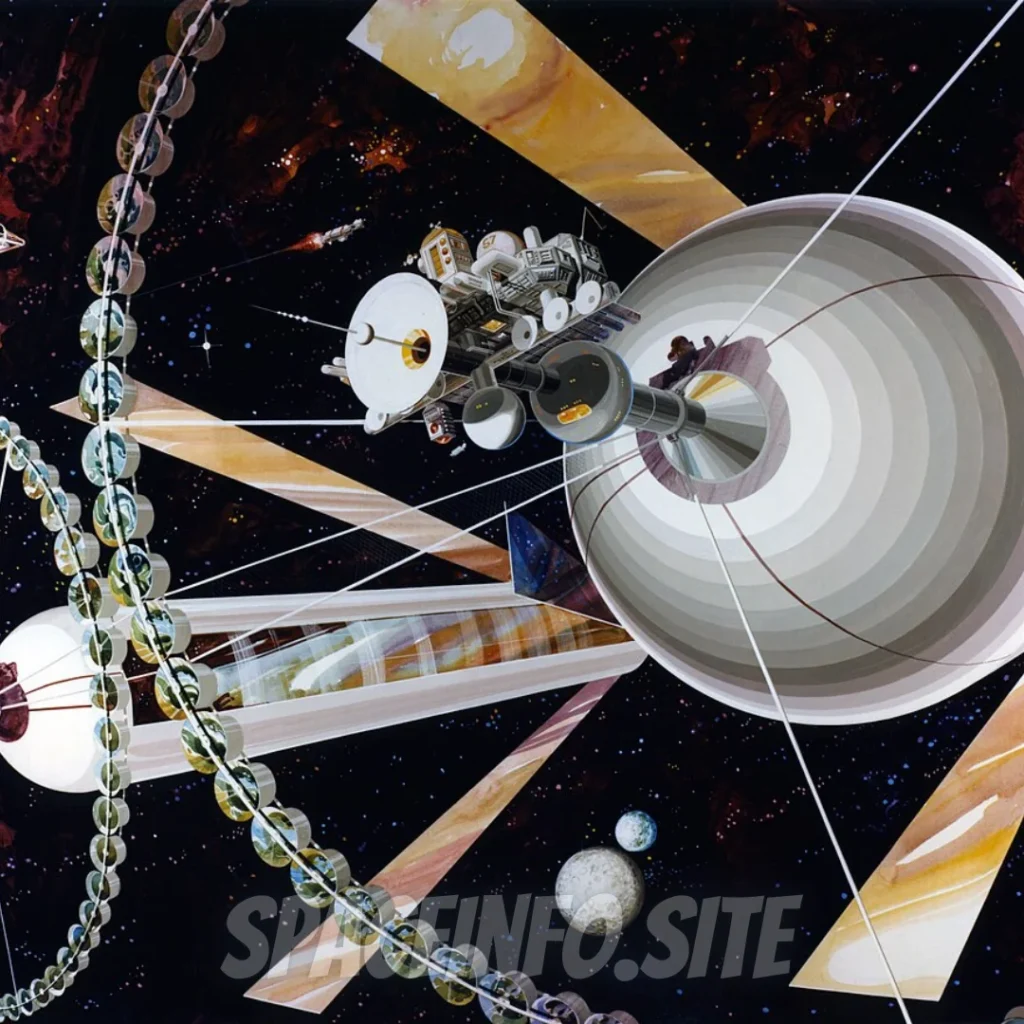Space Colonization

Space colonization has long gotten the human inventive brain, tending to a conclusive backwoods for examination and perseverance. As Earth’s resources become dynamically focused and our mechanical capacities advance, spreading out human settlements past our planet grows more possible and desperate. This expansive web diary will dive into the arrangement of encounters, challenges, potential benefits, and prospects of Space colonization, examining the motivations driving this phenomenal endeavor and the means essential to make it a reality.
TOPIC : the-mysteries-of-dark-energy
The Authentic Setting of Space Colonization Thoughts
Early Dreams and Science Fiction
Space colonization has significant roots in humankind’s arrangement of encounters, with early dreams now and again settled in fables and science fiction. Creators like H.G. Wells and Jules Verne established the groundwork for imagining human life past Earth. Wells’ “The Contention of the Universes” and Verne’s “From the Earth to the Moon” amazed swarms with accounts of interplanetary travel and examination.
The Space Age Starts
The mid-20th century saw the start of the Space Age, put aside by the farewell of Sputnik 1 by the Soviet Relationship in 1957 and the resulting space race between the US and the USSR. This time brought the principal human-made objects and, finally, individuals themselves into space. Yuri Gagarin’s significant excursion in 1961 and the Apollo moon appearances from 1969 to 1972 displayed humankind’s ability to meander past Earth’s current circumstances, lighting serious discussions about dependable space settlements.
Visionaries and Pioneers
Obvious figures like Wernher von Braun and Gerard K. O’Neill contributed in a general sense to the conceptualization of Space colonization. Von Braun, a logical virtuoso, proposed space stations and lunar bases as wandering stones to Mars. O’Neill, a physicist, envisioned tremendous turning space regular environmental elements, known as O’Neill chambers, prepared for housing extraordinary numerous people in space.
The State of the art Time frame
In numerous years, reestablished interest in space colonization has been empowered by degrees of progress in advancement and the improvement of private space associations. Visionaries like Elon Musk, trailblazer behind SpaceX, and Jeff Bezos, coordinator behind Blue Start, have expressed forceful plans for Mars colonization and space settlements, underlining the meaning of making humankind multi-planetary creature gatherings.
Motivations for Space Colonization
Ensuring Human Perseverance
One of the fundamental motivations for space colonization is ensuring the somewhat long perseverance of the human species. Earth is vulnerable to various existential risks, including space rock impacts, supervolcanoes, and natural change. Spreading out self-supporting territories on various planets or in space can give a safeguard against such shocking events, ensuring that human improvement can continue whether or not all things go horrendously wrong in the world.
Developing Human Horizons
Humankind has perpetually been driven by the desire to examine and develop its perspectives. Space colonization tends to have conclusive edges for examination, offering important opportunities to track down new universes, resources, and conceivably in any event, living things. This drive to examine and expand can develop improvement, energize individuals later on, and add to the total progression of humanity.
Coherent Types of Progress
Colonizing space presents unmatched entryways for intelligent investigation and imaginative types of progress. Space settlements can go about as stages for focusing on the effects of stretch space home on the human body, coordinating examinations in microgravity, and developing new advances for resource use and life support. The data procured from these endeavors can have clearing consequences for science and development in the world, to say the least.
Monetary Potential
Space colonization holds enormous money-related potential, with open entryways for mining space rocks, harnessing sun-based energy, and developing new organizations. The gigantic resources available in space, including exceptional metals and minerals, can maintain money-related improvement and mechanical new development. Additionally, space for the movement of business and business experiences can make new business areas and business open entryways, driving financial expansion.
Empowering Overall Joint Exertion
The endeavor of Space colonization can energize overall joint exertion and coordinated effort. The hardships of spreading out space settlements require total undertakings, joining the inclination, resources, and limits of nations all over the planet. Agreeable space missions can progress peaceful cooperation, update mollifying relations, and add to overall relentlessness and fortitude.
Hardships of Space Colonization

Particular and Planning Troubles
Space colonization presents different specific and planning challenges that ought to be crushed to spread out efficient settlements. These hardships integrate making strong space contraptions and drive structures, making life sincerely steady organizations, and creating conditions fit for shielding tenants from the severe conditions of the Space.
Life Support and Viability
Ensuring the perseverance and success of pilgrims in space areas of strength for requires sincerely steady organizations that give air, water, food, and waste organization. Making shut-circle systems that reuse resources and breakpoint waste is major for practicality. Moreover, watching out for the psychological and social pieces of long stretch space home is important for the mental well-being and association of Space organizations.
Radiation and Normal Dangers
Space pioneers face basic normal dangers, including receptiveness to colossal radiation, absurd temperatures, and micrometeoroids. Defending inhabitants from these hazards requires advanced safeguarding advances and regular environmental factors plans. Making countermeasures to direct the effects of deferred radiation receptiveness is particularly fundamental for ensuring the prosperity and security of Space pioneers.
Resource Use and Freedom
Spreading out autonomous settlements requires successful resource utilization and in-situ resource use (ISRU) propels. This incorporates removing and taking care of resources available on various planets or in space, similar to water, minerals, and building materials. Making trustworthy strategies for conveying food, delivering energy, and gathering essential items is basic for the long-term viability of Space settlements.
Financial and Political Considerations
Space colonization similarly incorporates complex monetary and political considerations. Financing space missions, spreading out authentic designs, and ensuring impartial permission to space resources are basic troubles. Changing the interests of various accomplices, including states, exclusive organizations, and overall affiliations, is basic for the compelling and legitimate progression of Space settlements.
Logical Districts for Space Settlements

The Moon
The Moon is ordinarily viewed as an incredible opportunity for space colonization in light of its closeness to Earth and the openness of resources, for instance, water ice. Lunar states can go about demonstrating justification for advancements and structures expected for extra far-away settlements. The Moon’s low gravity and stable environment make it an ideal region for coherent investigation, resource extraction, and potential farewell areas for missions to various bits of the planetary gathering.
Mars
Mars is one of the most reassuring complaints for human colonization given its by and large innocuous environment, presence of water, and potential for terraforming. The Red Planet offers astounding entryways for sensible examination, resource utilization, and the underpinning of self-supporting settlements. Hardships like radiation receptiveness, low temperatures, and the slim air ought to be tended to, yet Mars remains a mark of intermingling for future colonization.
Space rocks
Space rocks address significant concentrations for space colonization on account of their plentiful resources, including metals, water, and various materials. Spreading out mining states on space rocks can give crucial resources for space settlements and support monetary activities. The low gravity of Space rocks presents stand-out troubles and likely entryways for climate advancement and resource extraction.
Space Conditions
Space conditions, for instance, O’Neill chambers and Bernal circles, offer elective ways of managing space colonization. These tremendous, turning plans can make counterfeit gravity and give a controlled environment to human homes. Space regions can be arranged in various regions, including Earth circle, Lagrange centers, and other stable districts of the close-planet bunch. They offer the flexibility to move and conform to different regions depending upon the situation.
The External Nearby planet group
The external nearby planet group, including moons of gas goliaths like Jupiter and Saturn, presents extra opportunities for colonization. Moons like Europa, Enceladus, and Titan have remarkable conditions and potential assets that can uphold human settlements. The difficulties of outrageous cold, radiation, and distance from Earth require trend-setting innovations and inventive answers for effective colonization.
Ventures Toward Space Colonization
Propelling Space Innovation
The most vital move toward space colonization includes propelling space innovation and creating dependable frameworks for transportation, life backing, and territory development. Proceeded with interest in innovative work, as well as a coordinated effort between state-run administrations, privately owned businesses, and global associations, is fundamental for conquering specialized difficulties and making space colonization doable.
Laying out Lunar and Martian Bases
Laying out long-lasting bases on the Moon and Mars fills in as an essential move toward space colonization. These bases can act as centers for logical exploration, asset extraction, and the advancement of innovations expected for long-haul residences. Lunar and Martian bases can likewise work with additional investigation of the nearby planet group and go about as venturing stones for additional far-off missions.
In-Situ Asset Usage (ISRU)
Creating in-situ asset usage (ISRU) advances is crucial for making self-supporting settlements. ISRU includes separating and handling assets accessible on different planets or in space, decreasing the requirement for resupply missions from Earth. This incorporates delivering water, oxygen, fuel, building materials, and food locally, improving the manageability and independence of room settlements.
Global Cooperation
Global cooperation is fundamental for the progress of room colonization endeavors. The difficulties of laying out space settlements require the consolidated ability, assets, and capacities of countries around the world. Cooperative space missions, joint exploration drives, and shared frameworks can advance tranquil participation, upgrade strategic relations, and guarantee fair admittance to space assets.
Moral and Legitimate Contemplations
Tending to moral and legitimate contemplations is significant for the capable improvement of room states. Laying out legitimate systems for space exercises, including property privileges, asset use, and ecological insurance, guarantees the fair and maintainable utilization of rooms. Moral contemplations, like the treatment of room homesteaders, the protection of extraterrestrial conditions, and the possible effect on native living things, should likewise be painstakingly thought of.
The Eventual Fate of Room Colonization
Mechanical Developments
The eventual fate of room colonization will be driven by mechanical developments that improve the attainability, supportability, and well-being of room settlements. Propels in drive frameworks, life support advances, territory development, and asset use will empower the foundation of independent settlements and work with the investigation of additional far-off areas in the planetary group and then some.
Development Past the Nearby planet group
While introductory endeavors will zero in on the Moon
, Mars, and others close by focus on, the drawn-out vision of room colonization reaches out past the planetary group. Creating innovations for interstellar travel, for example, high-level drive frameworks and generational space apparatus, will be fundamental for arriving at far off star frameworks and investigating exoplanets with potential for human homes.
The Job of Computerized reasoning
Man-made brainpower (artificial intelligence) will assume a critical part coming down the line for space colonization. Computer-based intelligence can help with independent tasks, asset the executives, and logical exploration, decreasing the dependence on human mediation and improving the productivity of room settlements. Simulated intelligence-fueled frameworks can likewise uphold the well-being and prosperity of room settlers by observing indispensable signs, giving clinical consideration, and working with correspondence.
Cultural and Social Effects
The foundation of room provinces will have significant cultural and social effects. It will reshape how we might interpret humankind’s spot in the universe, motivate new types of craftsmanship and writing, and encourage a feeling of worldwide solidarity and participation. Space colonization likewise presents amazing open doors for tending to social and monetary disparities by making new roads for development and improvement.
Manageability and Stewardship
Guaranteeing the manageability and stewardship of room states is principal for their drawn-out progress. This includes limiting the natural effect of room exercises, protecting extraterrestrial conditions, and advancing mindful asset usage. Economical practices and moral contemplations should direct the improvement of room settlements to guarantee the safeguarding of space for people in the future.
End
Space colonization addresses the following extraordinary outskirts for mankind, offering open doors for investigation, logical headway, and the drawn-out endurance of our species. While critical difficulties stay, the headway made in space innovation, global cooperation, and interdisciplinary exploration carries us closer to understanding the fantasy about laying out human settlements past Earth. As we set out on this stupendous undertaking, we should focus on manageability, moral contemplations, and worldwide collaboration to guarantee the dependable and evenhanded advancement of room states. The excursion to space colonization is a demonstration of human inventiveness, strength, and the immovable soul of investigation that drives us to try the impossible.